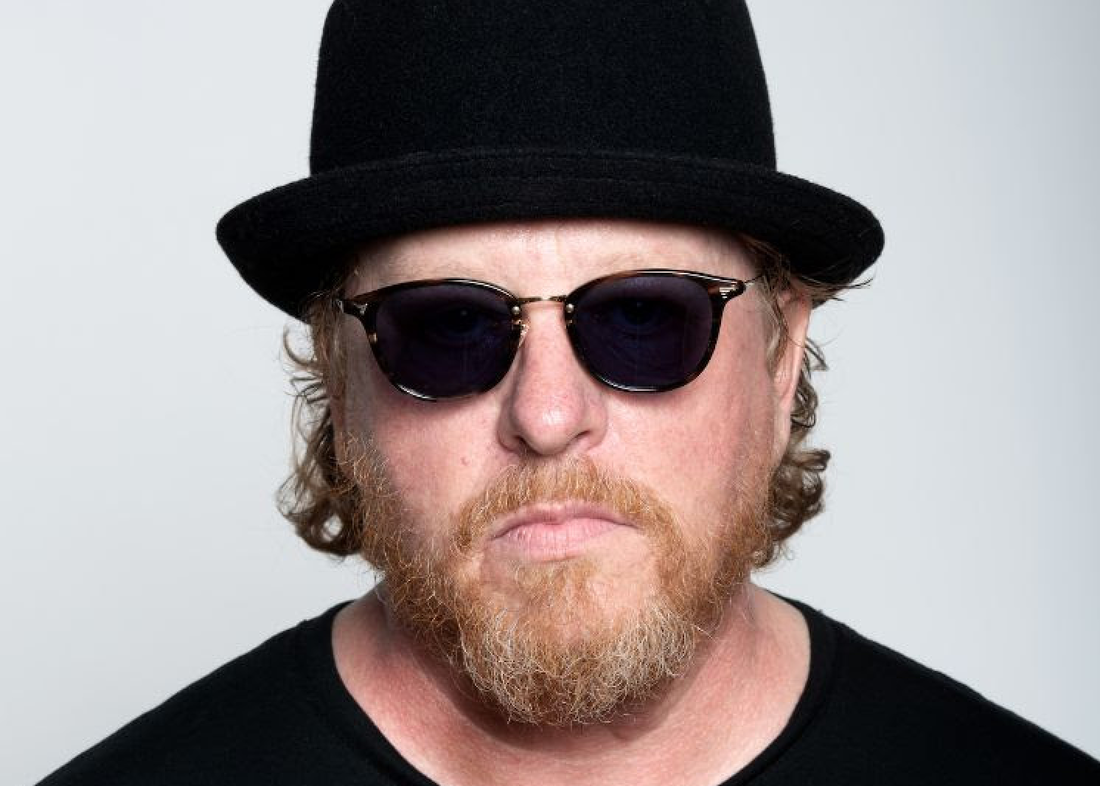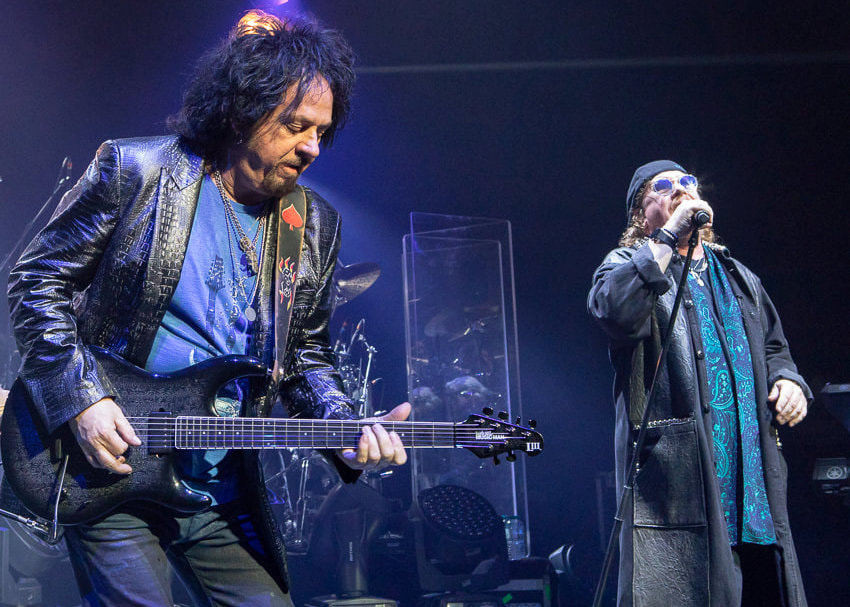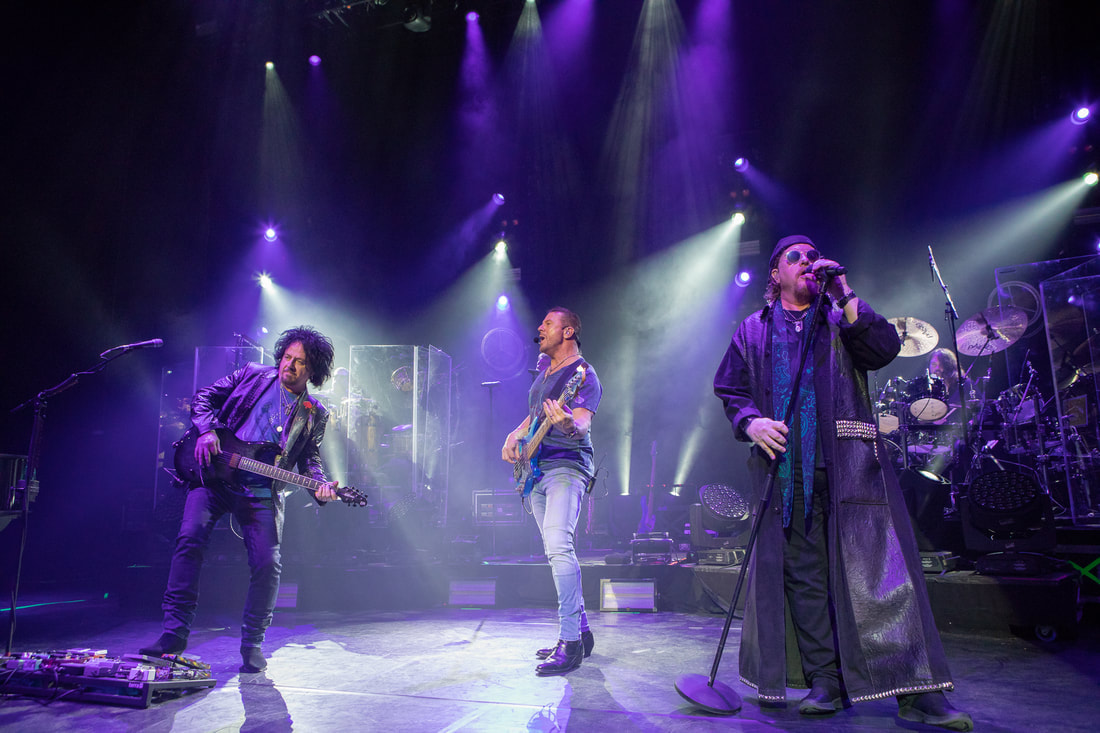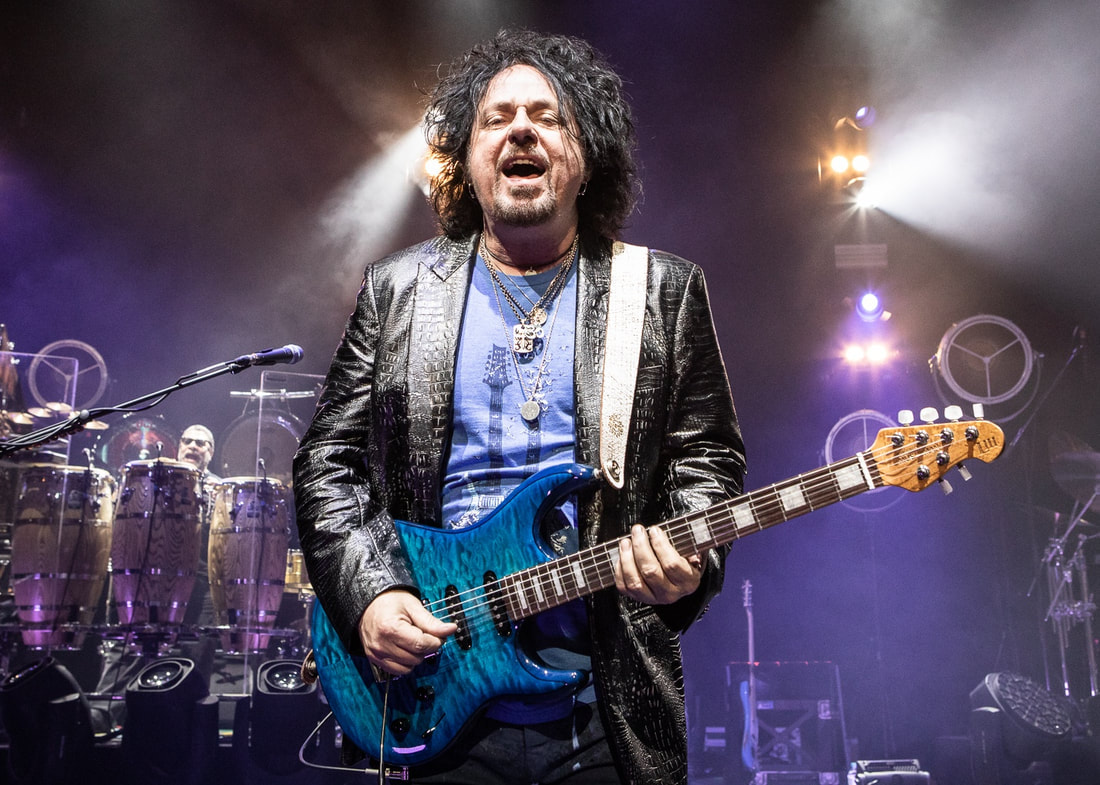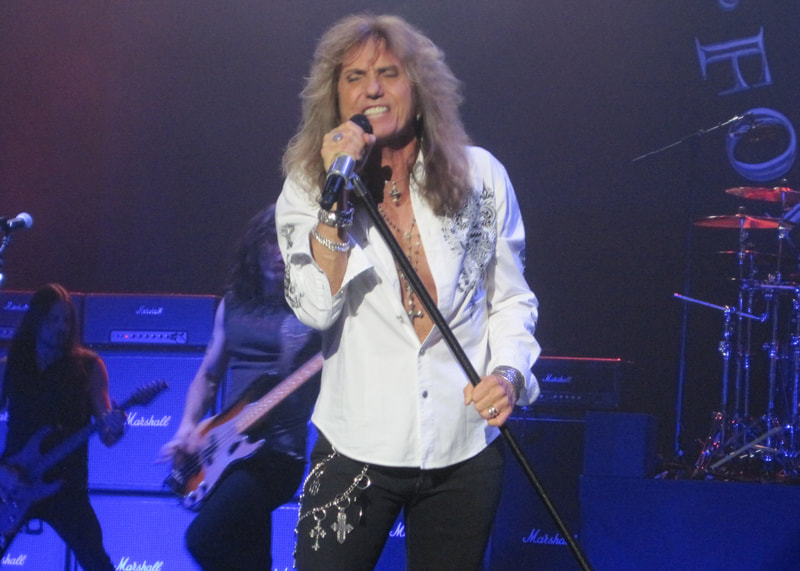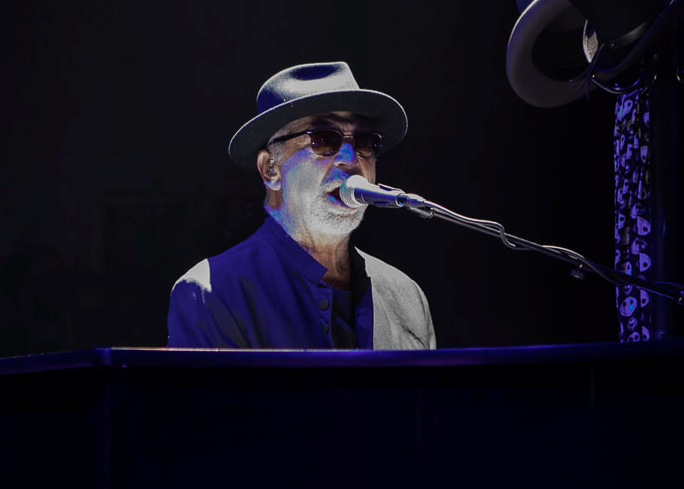|
A number of years in the making, Joseph Williams has just returned with the almost entirely self-produced ‘Denizen Tenant’. A personal, as well as family affair, it’s an album that contains “the best example of just who I am as an artist”, says the Toto singer. Roping in a number of Toto members past and present, including David Paich and Steve Lukather, the album will be a real treat for fans of the hard rock giants. We sat down with Joseph for a chat about the album, Toto’s ‘Forty Trips Around the Sun’ tour, and his entry to and exit from the band in the 1980s. No lessons; Eamon O’Neill.
Hi Joseph, How are you doing today?
I’m very well, thank you. Considering we’re all stuck inside and we can’t play live, which is the hardest part, I’m well. It must have been great to work on a new solo album during this past year of the pandemic. It was great. It was something that I needed to do. I had planned on jumping in and doing a solo album even before the pandemic started, back in 2019. I actually started developing some of the songs on this record as early as 2016, so I knew I was going to make a record. I was just sort of working myself up to it, and I knew that by the time we stopped touring in 2019, I would have all of 2020 to work on the album – forget about the pandemic. Of course, I did most of that during the pandemic, so I was grateful to have a project already in the works, and something to do once we were all locked down. Before going on to talk about the album, I wanted to ask how you enjoyed Toto’s ‘Forty Trips Around the Sun’ tour. Steve Lukather confessed in our earlier interview that things started to fall apart towards the end if it. Well, first of all, yeah, things started to go a little bit bad. You’re talking about the very last tour we did, right? There were some members that just didn’t want to tour anymore, and that was starting to wear on people, and all that kind of thing. But the one thing about the band is that when it came time to do the show, everybody was just as professional and happy to be there as ever. Also, we had this lawsuit thing that Luke and Dave [David Paich] were dealing with a bit, with regards to the name and all that stuff that was still going on, so everybody was just at a point where we wanted to stop for a while. It was clear that we needed to just stop for a while and a few people were going to take an exit, and then Luke and I were going to figure out what we were going to do from there. But in terms of how the shows went and everything during that tour, it was fabulous, all the way to the end. You had a very successful period with Toto in the mid ‘80s; how was it coming back to the band again for a second bite? Well it was great. Luke had dissolved the band in ’08, that version, and I was talking with him during all of those years. I had actually worked with him in ‘Falling in Between’ [2006], and sat in as a guest during that touring cycle and all of that stuff, but once that was all said in done, in 2010, the idea came up for us to put together a Toto, and go out and make some money for Mike Porcaro, who was dying of ALS. So that was the original intent. So, the second bite at the apple wasn’t really that kind of a thing; we didn’t really have any sort of plans to restarting or anything, it was mainly just to go out there do some performances to make some money to supplement Mike Porcaro’s income. Then once we went out into Europe, it was clear that the audience’s wanted to come and see us, and they kept getting a little bit bigger every year, and it just kind of blew up from there. Moving on to the reason we’re here, and ‘Denizen Tenant’ is about to be released, on the same days as Steve Lukather’s new solo album. Is it inevitable that the two are going to get compared?
Well, yeah. We made these projects completely independent of each other. When we finished working on the road in 2019, Luke had already had plans to go into the studio and make an album the way he wanted to make it; he wanted to make it in a week, he wanted to have live musicians, he wanted to do all the vocals right away. He had a specific thing that he wanted to do for his album that was very old school, sort of ‘70s-style method of making a record. That was what he was going to do for his solo record, and it was completely unrelated to mine. As I said, I had already been working on mine a little bit over the years, but the majority of it was after he had finished his album. And also, he didn’t write anything on the record with me, so his influence as a songwriter isn’t really on my record. The two albums do sound completely different. My record was always going to be sort of a, quote unquote ‘studio album’, in the same way like we would make a Toto album; take months and flesh it out and produce it out. The intention for me was always to make that kind of album. There was never any point where we said; “well, since our albums are going to come out together, maybe we should do a couple of extra tunes or something to make them sound more like each other?” That was never the idea. They’re companion pieces to each other almost because they are so different. The album kicks off in a very subtle way, with ‘Never Saw You Coming’; it’s a melancholic, moody piece that really shows off your voice, from the highs to the real deep lows. Well, that’s just it; that song and the arrangements and the way it was written, it’s really just the best example of just who I am, as an artist, really, and the kind of vocals I like to do, which means low and high. I love the sound of lots of voices, all kinds of different ranges, and going all over the place in the melody and stuff. So that was a chance to do a little bit of that. The song came together a little bit at a time over several years. Finally, I finished the lyrics and the final lyrics in 2020. But I don’t know, there’s something about that one, in the arrangement and in my piano part in the chorus that’s just like; “yeah, that’s really ‘me”; like, that piano playing, the changes and everything, that’s totally me, not anyone else; that’s my style. You’re obviously known primarily as a lead vocalist, and there’s lots of space for your voice in a track like ‘Liberty Man’. Well, that too was a piece that I had that I started and the chorus just wasn’t right, so David Paich finished the song with me. The chorus in that song is really a very David Paich composition. That in and of itself is jut great, because it’s always a rare and great pleasure and opportunity to write with Dave. We always end up coming up with something cool. I love that 6/8 groove, and I just have a thing in my heart for that swashbuckling kind of feel. It also seemed like the perfect opportunity, because of the style of the song; this is really going to be so much better with Simon [Phillips, drummer]. My original drums were very different to what Simon does at the beginning of the thing; he created that whole part, which changed the whole feel of the song and made it what it is. It sounds like you enjoy the creative process working with these people. All of these things are incredibly collaborative. Yeah, I made the record on my own, but it wasn’t in a vacuum. All the people that I work with, it’s incredibly collaborative and they add their ideas to the mix; Mike Landau [guitarist] especially. Landau just played his butt off on the whole record. He’s of those guys that’s just a huge help in development. When you’re playing with an idea for a song, he’ll come up with something that will help you move onto the next thing that you have to do. It’s great that you collaborate with so many people, but is it nice to be the boss and be in control, given that everyone in Toto is a producer? Yes. It’s very nice! I mean, why wouldn’t it be!? Yes of course, it’s great. I mean, the last project that we did as Toto [‘Toto XIV’, 2015], they kind of put me in charge of most of it because my engineering skills are, I guess, just a little bit more honed because of all the years in TV that I was composing and stuff. So I sort of became the lead supervising producer on that whole project. So yeah, I had more of the last word on that project, but like you said, everybody in that band is a skilled and experienced producer, and they all have their opinions which are all very strong, but when you have four people, its about compromise. When there’s one person in the captain’s chair, it’s a little bit easier, and also, the end result is exactly the way I wanted to hear it, as opposed to having to compromise. You’ve covered Peter Gabriel’s ‘Don’t Give Up’, with your daughter on this album; why did you choose that song?
Both covers, that one and the Beatles song [‘If I Fell’] happened the same way. I was sitting at my workstation, and I took a break, and I start looking up some YouTube things, and one of the things that just comes up is the Kate Bush and Peter Gabriel video. So I watched it, and I just reminded myself; “oh man, I love this song so much”. When it was finished, I literally just turned to my piano, and started to play the changes and sing it. I just started to mess around, you know; “what would it sound like if I sang it, or if I did the intro with more of a…” blah blah blah, and then I just got carried away, and I ended up after about two days having the basis of a track to work on. That’s literally how I picked it to be on the record; it was a total accident. Once it was clear that I was going to do it, I had to find somebody to do the Kate Bush part, and so the idea occurred to get my daughter, who’s a fantastic singer. She’s been working as a professional since she was a kid, and I thought that the lyric for the song might also work vey well as a father daughter conversation. Another track I really enjoyed is ‘Black Dahlia’. ‘Black Dahlia’ was sort of a getting back together of me and my friend Jay Gruska. Jay was, and is my ex-brother in law. He was married to my sister for many years, and my niece and nephew are his kids, so we’re family. We’ve been family ever since I was a teenager, and Jay, who is an incredible musician and composer, he produced my first album [‘Joseph Williams’], back in 1981. So we rekindled our friendship, and while I was working on my album I asked him if he wanted to write something with me. So we started to work on ‘Black Dahlia’, which we did all in his studio. Jay is just as skilled, all his own self-production, as anybody is; he’s one of the best that there is. So that’s why he’s the producer of that song, because we wrote it, recorded it, did everything up at his place, and he’s playing most of the keyboard stuff. And my niece, his daughter, is playing drums! So it was a real family affair? Exactly! And Jay knows me, he knows my sound. We’re very similar together when we write, like me and Dave; it’s very easy and he’s an incredible piano player, so I just said; “yeah, you be the producer on this one. I’ve got enough on my plate to finish at home. You go ahead. Let’s just say you’re the producer of this tune”. It wasn’t intentional, but as we were writing it, it was clear that it was sort of a nod, or a homage to Steely Dan; it’s that kind of a song. Going right back to when you joined Toto, and the band had had massive success, but had then taken a dip in popularity; did you feel under pressure to restore them to success?
It was definitely pressure back in those days. I joined when I was 26, and I was a very young 26. I was, first of all, so excited to just be a part of the group, and just be with them that most of my thoughts were occupied with that, to be honest with you, instead of thinking about taking care of my voice, which is what I should have been thinking about more often, because the job live, is a very difficult job, singing Toto songs. But yeah, I felt pressure coming in. I felt like, you know; this is odd, because basically, they’re coming off of their biggest hits, and obviously, they want to have big hits again - that kind of a thing. They were looking to the lead singer to fill the slot for the band that they needed; somebody to sing most of the material. I felt it, and those guys definitely made you feel it too, because they had issues with their first two lead singers [Bobby Kimball, 1977 – 1984, and Fergie Frederiksen, 1984 – 1985], so by the time they got to me, they were watching me like a hawk! So, it was tough, but I was so young and naïve at the time that I kind of really didn’t know what to do with that pressure. What do you remember about your audition for Toto? We went to a rehearsal place that the band was using, and they set up and I came in, and we went through the big three songs; ‘Hold the Line’, ‘Rosanna’, and ‘Africa’. They wanted to make sure that I could sing those tunes, and then I think we did one other deep cut, but that was it. The whole audition was just singing the main songs; they wanted to make sure that somebody could do that night after night. Did you feel; “I think I’ve got this!”, after your audition? On the day, absolutely. I nailed it, yeah. You co-wrote ‘Pamela’ with David Paich, which was a huge hit; that must have felt like a real validation for you. Well, from day one when I came into the group, Dave and I started a relationship as writers. We got on immediately. We wrote ‘Till The End’ together for ‘Fahrenheit’ [1986], and other things on that album, so by the time we got around to ‘Pamela’ [1988], we had already been writing together, and it was already very comfortable. I guess the sort of excitement and gratification of its success, I didn’t really feel it until later. After it was out, it was clear, especially in the European and Japanese markets, who thought of it almost as big of a hit as ‘Rosanna’ – almost! Another massive hit from ‘The Seventh One’ was ‘Stop Loving You’. Yeah, I mean when we’re over in Europe and overseas, I feel very much as big as everyone else who’s ever been in the band. When we’re in the United States, I feel about this big [makes tiny gesture with finger and thumb], because here, it’s mostly about the first four albums. The band never really latched on with the rest of the albums after those first four, so people come and see the concerts and they don’t really remember who the lead singer was or what it was. It sounds close, and so it’s fine with everybody, but nobody knows any of the tunes here past the first four albums. Strangely, the song ‘The Seventh One’ was absent from most pressings of the album; do you know why that was?
Well, first of all, ‘The Seventh One’ was a piece of music that was a warm up. We were in the studio getting sounds for the engineer, and it was like; “I need to hear more kick; I need to hear more snare; let me hear the bass with the drums; okay, low let me hear the guitar”, and so we all started jamming. I was on the mic in there because I think we were going to do a track - I think it was ‘Pamela’ or something - and so while we were getting sounds for the engineer, Jeff [Porcaro, drums] is playing, Mike [Porcaro, bass] is playing the thing [sings ‘The Seventh One’ bass line], and I just started chanting; [sings] “one, two, three, four, five, six” - just like you’re checking a microphone. That’s what it was; it was like a total, like soundcheck kind of thing. And they recorded it, and we thought; “well, this isn’t really a real song, so we’re not going to have it on the album”, but the record company for the Asian market said; “no, no, no! Let’s use it for a bonus cut”. That’s how it happened. Did you have the title for the album, or did it come from you singing that line? Yeah, we did have the title of the album. That’s exactly why I was singing that. I was singing that because, I think we had been briefly talking about the title of the album before we started playing. Sadly, Steve Porcaro left around the band that era, saying that he felt his role in the band had been diluted at that time; what’s your take on this? What I remember about it more than anything was just that it had to do with some of the personality stuff between him and his brother Jeff. They had a little bit of this [butts fists together] going on between the two of them, and I just think Steve didn’t feel appreciated. I think what he said is exactly true; that he felt like his role was diminished, from the first four albums; that they were going more in the direction of just not needing as much synthy-type programming, or whatever. And also, Steve never really liked to do live that much. He’s fantastic live, but he’s never really that happy when he’s doing it live. So I think between all of those things put together, that was kind of what it was. But don’t quote me, because I’m not him. You left the band, or were asked to leave shortly after that period; what was that like for you? It was tough. It was definitely devastating. Everything was going so well. The ‘Fahrenheit’ album was great to work on, that tour was fantastic, and then we worked on ‘The Seventh One’ album, which was also a lot of work, but it was a great result. And then we did ‘The Seventh One’ tour, which was a much long tour. It had a lot more songs in it, and in those days there was no ear monitors - all you had were the wedged monitors - and also, the guys didn’t ever change any of the keys to any of the songs, so it just a matter of time for my softer voice than Bobby or the other guys, and I just started to lose my voice, live. It was a simple as that; I just started to lose my voice, live. I couldn’t hold it together, and it was a horrible tour because my voice started out off – it was funky – and the guys just didn’t have any patience for the lead singer being off his game. Everybody else was playing their ass off and doing their virtuoso thing, and the one element that needs to be ‘on’ every day was fucked up, and so they just said; “we can’t have that”. And they were a little bit mean to me towards the end, and so I sort of stormed off as well, which is why the story was that I left, and that they also fired me. The fact is that they fired me, and they had good reason, because I couldn’t fucking sing anymore! I couldn’t sing live! How did you cope with being let go from the band? Yeah, I was devastated. There was a couple of years of horrible depression, and I ended up going out and getting a job at a hotel, doing just [regular] work right around the time I got married. It was a few years before I got back into making a solo album, and you know, it took a few minutes for me to recover. Back to the present, and what’s next for Toto? We’re waiting and hoping that the whole pandemic thing eases up so that people can go out and actually fill up venues, so that we can go play. That’s the next thing for us. We want to play; we’re desperate to play. It’s horrible not being able to play. We’ve got a great new set of guys that we’re playing with, and we’re all ready to go. In the meantime, I’m going to keep making videos for all the songs on my album. Joseph Williams' 'Denizen Tenant' is available now, via The Players Club / Mascot Label Group. Like this interview? Like us on FaceBook and follow us on Twitter for regular updates & more of the same. |
|
toto.
"We’re desperate to play. It’s horrible not being able to play. We’ve got a great new set of guys, and we’re all ready to go." - Joseph Williams.
© 2016 - 2024 eonmusic.co.ukContact: [email protected]
|

